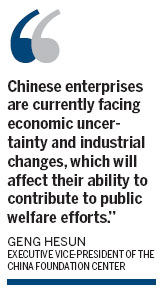
Corporate foundations in China are playing an increasing role in public welfare, according to a report on China's corporate foundation development on Friday.
The report by the China Foundation Center and the consulting company Corporate Citizenship in Action at the China Charity Fair showed there were a total of 285 corporate foundations in China by the end of last year.
Their assets totaled 3.64 billion yuan ($570 million) by the end of 2010.
|
 |
According to the report, the majority of corporate foundations are located in major cities in eastern and southern China, with Guangdong province topping the list with 54.
Sixty-six percent of the foundations had between 2 to 5 million yuan in starting capital, and 4 percent started with more than 100 million yuan.
Donations mainly come from their affiliated companies and other foundations.
The report found that a majority of charity projects are concentrated in education, poverty alleviation and natural-disaster relief.
Most of the corporations established their own foundation for corporate social responsibility activities and brand promotion and to provide more professional welfare services, the report said.
Geng Hesun, executive vice-president of the China Foundation Center, said it is the first-ever comprehensive report on corporate foundations since 2004, when the government allowed their establishment.
Corporate foundations have been actively engaged in public affairs and play an important role in China's philanthropy because of their advantages in social influence, capital and resources, the report said.
Another report released by the China Charity and Donation Information Center in June showed that China received 84.5 billion yuan in total charitable donations in 2011. Enterprises contributed 57.5 percent to that figure.
Donations by entrepreneurs accounted for 89.5 percent of all individual charitable donations, which totaled 26.7 billion yuan.
"I think many enterprises are still unfamiliar with corporate foundations and their purpose. But Chinese enterprises are currently facing economic uncertainty and industrial changes, which will affect their ability to contribute to public welfare efforts," Geng said.
huangyuli@chinadaily.com.cn







